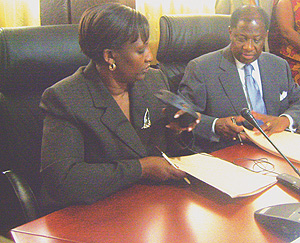• Justice Ministers to advice on Nkunda case KINSHASA - The two-day bilateral ‘Four plus Four’ meeting between Rwanda and the Democratic Republic of Congo (DRC)held over the weekend in Kinshasa, has recommended a Heads of State Summit between President Paul Kagame and his Congolese counterpart Joseph Kabila. The two countries’ Foreign Affairs Ministers confirmed this to The New Times adding that they also recommended that the respective Justice Ministers meet to give the framework legal advice on Gen. Laurent Nkunda’s transfer to the DRC.


• Justice Ministers to advice on Nkunda case
KINSHASA - The two-day bilateral ‘Four plus Four’ meeting between Rwanda and the Democratic Republic of Congo (DRC)held over the weekend in Kinshasa, has recommended a Heads of State Summit between President Paul Kagame and his Congolese counterpart Joseph Kabila.
The two countries’ Foreign Affairs Ministers confirmed this to The New Times adding that they also recommended that the respective Justice Ministers meet to give the framework legal advice on Gen. Laurent Nkunda’s transfer to the DRC.
"The two parties recommended a meeting at the level of the Heads of State to consolidate the achievements of the ongoing bilateral talks between the two countries,” DRC’s Col. Augustin Mamba read from a joint communiqué.
Rwanda’s Rosemary Museminali and her Congolese counterpart, Alexis Thambwe Mwamba, also told reporters that the meeting had observed legal complexities between DRC and Rwanda over Nkunda’s transfer.
Subsequently, they proposed the involvement of their respective Justice Ministers for legal advice.
"We realize that there are some legal complexities but indeed, this should not deter us from continuing what we had agreed and, as our Ministers meet and help us to resolve these issues, then we should progress even on this,” Museminali noted, reiterating that Rwanda is in principle committed to returning Nkunda to DRC.
"We believe that if we have been able to tackle other complexities, this part is only a small component in problems and we should be able to tackle it and move forward,” she said.
"We recognize that we have had significant movements on major problems that concern our countries,” he noted.
He said that the meeting decided, in order to resolve the questions that crop up over the judicial process, the two justice ministers are going to meet in days to come, either in Kinshasa or Kigali to manage the issue.
The sessions held at the Congolese Ministry of Foreign Affairs in Kinshasa started Friday evening, with the first session running late into the night.
This latest session was a follow up of several others held in different parts of both countries, including - Kinshasa, Kigali, Goma and Rubavu.
High on agenda was consolidation of the recent successes on the war against the Democratic Forces for the Liberation Rwanda (FDLR) in the Eastern DRC.
The two parties stressed the need to pursue FDLR or ex-FAR/Interahamwe wherever they are and called for support from the international community to impose sanctions on the leaders of ex-FAR/Interahamwe still at large worldwide.
Also in the picture is setting up a permanent joint sub-commission on defence and security to exchange information and act on security matters of common interest.
Mwamba stressed this would help sustain the achievements of the recent Rwanda-DRC military operations against FDLR, operations of which North Kivu Governor Julien Paluku insisted were gaining momentum, especially given persistent mobilization of the masses.
Optimism too was emphasized by former Umoja Wetu commander, Gen. John Numbi, in an interview with Rwandan journalists covering the meeting.
He stressed that FDLR cannot fully regenerate for two major principles of war.
First, he maintained, one cannot wage war without the support of the population and, secondly, without political support.
"Yesterday, the FDLR benefited from the collusion with the population. Today, the population has a firm word and, is strict that they must return to Rwanda.”
"We won’t even allow them room to breath. They survived on the timber they exploited and now we can’t allow them to do so. They lived on the mines but we prevent them from exploiting our gold or iron ore and they are in difficulty. How then can they survive without medication water or even food?”
The immediate exchange of Ambassadors, in view of advancing diplomatic relations, was again echoed but no date was given.
"It is difficult to give a precise date because the process of nominating Ambassadors doesn’t concern only Foreign Affairs ministers. These ones (ministers) propose but after that there is the Head of State, because the Ambassadors represent their countries but also represent the Head of State who must decide on the person designated,” Mwamba said.
Also discussed was the common border and, it was agreed that experts will meet starting April 16 to 18 to review the situation and provide recommendations on the way forward.
Ends


